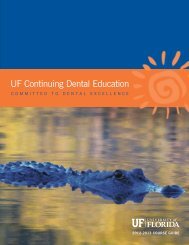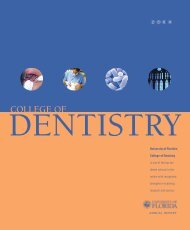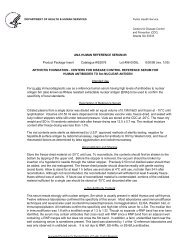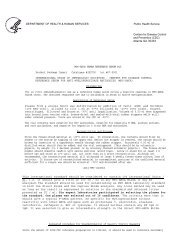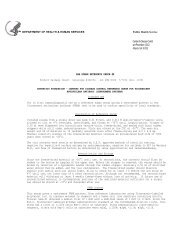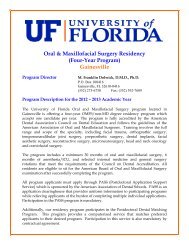Download - College of Dentistry - University of Florida
Download - College of Dentistry - University of Florida
Download - College of Dentistry - University of Florida
You also want an ePaper? Increase the reach of your titles
YUMPU automatically turns print PDFs into web optimized ePapers that Google loves.
Procedure 9.190, applicable to review <strong>of</strong> quasi-judicial decisions <strong>of</strong> an administrative body not subject<br />
to the Administrative Procedure Act, by filing a petition for certiorari review within thirty (30) days<br />
<strong>of</strong> the final university decision.<br />
(e) The Office <strong>of</strong> the Ombuds (Ombuds)was established to assist students in resolving<br />
problems and conflicts <strong>of</strong> an academic nature. This <strong>of</strong>fice provides an unbiased, informal<br />
avenue <strong>of</strong> redress for students' grievances which arise in the course <strong>of</strong> interacting with the<br />
institution. The Ombuds is available to <strong>of</strong>fer assistance after a student has exhausted<br />
all college appeals. The Ombuds works to achieve a fair resolution and works to<br />
protect the rights <strong>of</strong> all parties involved.<br />
Grievance policy<br />
A grievance is defined as dissatisfaction when a resident believes that any decision, act or condition<br />
affecting his or her program <strong>of</strong> study is arbitrary, illegal, unjust or creates unnecessary hardship. Such<br />
grievance may concern, but is not limited to, the following: academic progress, mistreatment by any<br />
university employee or student, wrongful assessment <strong>of</strong> fees, records and registration errors, discipline<br />
(other than nonrenewal or dismissal) and discrimination because <strong>of</strong> race, national origin, sex, marital<br />
status, religion, age, veteran's status, or disability, subject to the exception that complaints <strong>of</strong> sexual<br />
harassment will be reviewed by the appropriate supervisory authority.<br />
(a) Prior to invoking the grievance procedures described herein, the resident is strongly encouraged to<br />
discuss his or her grievance with the person(s) alleged to have caused the grievance. The discussion<br />
should be held as soon as the resident becomes aware <strong>of</strong> the act or a condition that is the basis for<br />
the grievance. In addition, or alternatively, the resident may wish to present his or her grievance in<br />
writing to the person(s) alleged to have caused the grievance. In either situation, the person(s)<br />
alleged to have caused the grievance might respond orally or in writing to the resident.<br />
(b) If a resident decides against discussing the grievance with the person(s) alleged to have caused<br />
such, or if the resident is not satisfied with the response, he or she may present the grievance to the<br />
program director or departmental chair. If, after discussion, the grievances cannot be resolved, the<br />
resident may contact the associate dean. The associate dean will meet with the resident and will<br />
review the grievance. The decision <strong>of</strong> the associate dean will be communicated in writing to the<br />
resident and constitute the final action.<br />
GRADUATE DEGREE-SEEKING STUDENTS<br />
It is the responsibility <strong>of</strong> the graduate student to become informed and to observe all regulations, critical dates,<br />
and procedures required by the program the student is pursuing. The student must be familiar with those<br />
sections <strong>of</strong> the Graduate Catalog that outline general regulations and requirements, specific degree program<br />
requirements, and the <strong>of</strong>ferings and requirements <strong>of</strong> the major department. Ignorance <strong>of</strong> a rule does not<br />
constitute a basis for waiving that rule. Any exceptions to the policies stated in the Graduate Catalog must be<br />
approved by the Dean <strong>of</strong> the Graduate School.<br />
After admission to the Graduate School, but before the first registration, the student should consult the college<br />
and/or the graduate coordinator in the major department concerning courses and degree requirements,<br />
deficiencies if any, and special regulations <strong>of</strong> the department. The dean <strong>of</strong> the college in which the degree program<br />
is located or a representative must approve all registrations. Once a supervisory committee has been appointed,<br />
registration approval should be the responsibility <strong>of</strong> the chair.<br />
Graduate students are subject to the same rules <strong>of</strong> behavior that govern undergraduates. The student conduct<br />
code is described hereafter.<br />
27



